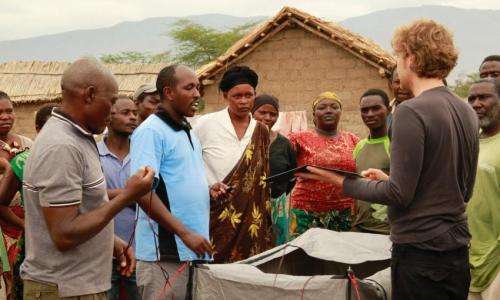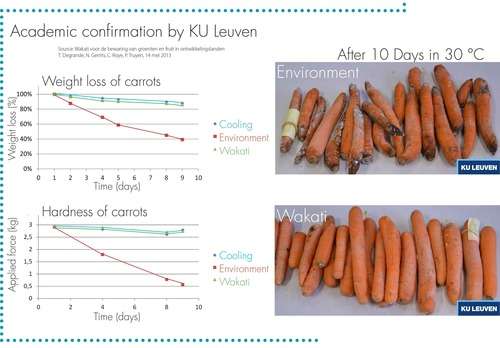January 3, 2015 weblog
Wakati solution aims to extend produce shelf life

In 2015, Africa continues to struggle with some fundamental problems. According to the United Nations 45 percent of all crops grown in developing countries never reaches the consumer and ends up as waste. No fridge for preserving food is part of the problem and even if a farmer had a fridge, he might need electricity to make it run.
Quoted in Fast Company, Arne Pauwels, founder of the Wakati project, said, "I decided to run an experiment: I would try to preserve fruit and vegetables in a hot, extremely humid microclimate." He took a wastepaper basket, placed an evaporator inside, with crops of lettuce inside and outside. He heated the room to over 86 degrees. He waited a couple of days and then he examined the crops inside the basket, which looked fine. The ones outside the basket had completely wilted. Pauwels, who studied product development at the University of Antwerp, took the first steps in growing out the project Wakati with a field trip to Ethiopia. It became clear to him that post-harvest losses were huge in Africa. Crops can dry out quickly after being harvested and there were no cheap solutions available.
He attributed these post-harvest losses to storage, to the lack of a solution within reach to store the crops long enough to get them to the people. Solutions calling for a power grid or massive amounts of water were out of the reach for many farmers. Wakati emerged as a solution that would serve as a solar-powered food preserver. The device could increase the productivity of smallholder farmers.
Wakati in Swahili means time, and the product is designed as a simple solution to preserve fruit and vegetables—to extend their life—up to ten times longer in dry climates. Wakati One is the product name. While it is not the answer for food storage over the longer term, it does make fruits and vegetables last longer, such that "Produce that would normally only have a shelf life of two days in a hot climate can last for 10 days with the Wakati," said TreeHugger. The product does not behave as a cooler; rather it provides a "humidified microclimate" that keeps the fruits and vegetables fresh. (Instead of cold, said Fast Company, the Wakati uses hot, humid temperatures, and still keeps produce fresh for a week.) So while it cannot keep produce for as long a time as a traditional fridge, it does keep the food fresh enough to reach the market.

TreeHugger detailed what the product looks like and how it works. A 3 W solar panel rests atop a tent-like box. The solar power runs a ventilator that evaporates a weekly supply of about 6.7 oz of water. This creates a humid environment in the Wakati, which keeps the food fresh.
Wakati's device is in test phase, according to the project site, and will soon go to market. Stu Robarts in Gizmag said a batch of 100 Wakatis was supplied to Haiti, Uganda and Afghanistan. (According to Fast Company, the team worked with a 3-D printing company Materialise to make prototypes for the batch to be tested in Haiti, Uganda, and Afghanistan.)
The optimal use of Wakati One is outside, in a warm and dry climate. Apart from a small amount of water— around 1L of water a week—. it doesn't require any extra resources. The product does not need a power grid, it works on solar energy. Fast Company's report said Wakati hopes eventually to sell the units to produce markets, distributors and consumers.
More information: wakati.org/
© 2015 Tech Xplore


















